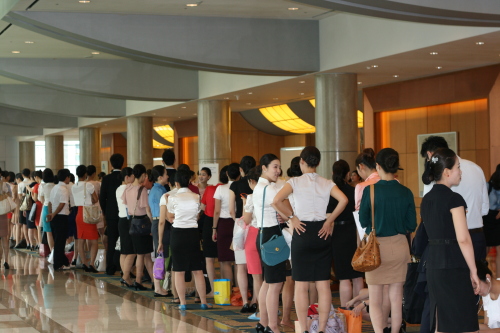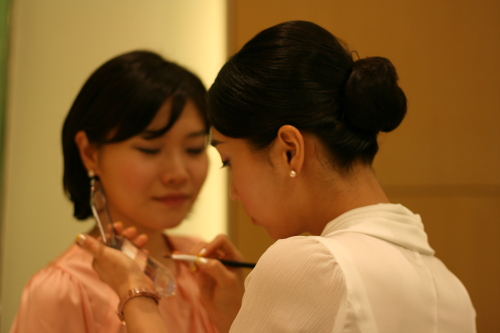Aiming skyward: Glamorous image of cabin crew keeps jobs out of reachThe first hopefuls arrived at Qatar Airways’ latest Seoul recruitment event at 2 a.m.
Well before the 9 a.m. start time, lines of immaculately dressed women and the occasional man snaked through the foyer of Seoul’s Grand Hilton hotel, waiting up to seven hours just to hand over their resumes.
“Many girls are dying to become a flight attendant here,” said Jessica Park, 26, who has been trying to take to the skies for more than four years.
“The reason is that girls can get paid a lot and have better social status,” she explained. “I heard in other countries the social status is far different, it is like a waitress job.”
She attends every recruitment event ― the Hilton event in August was the fourth Qatar has held in Korea this year ― and, impressively, has reached the final stage twice.

Cabin crew hopefuls wait to be interviewed at a Qatar Airways recruitment event at the Grand Hilton hotel in Seoul, August. (Hannah Stuart-Leach/The Korea Herald)
Qatar is the airline of the moment ― it won the Skytrax Airline of the Year award against 199 other airlines in June ― which goes some way to explaining the Saturday morning frenzy.
But in Korea, one hopeful explained, cabin crew jobs are so esteemed that some are fearful to tell friends and family of their aspirations in case they are scoffed at for not being “good enough.”
Rewards for working for the world’s best airline include free fully furnished accommodation, a tax-free monthly salary of $1,579, medical and life insurance, and travel concessions.
But even in this, one of the best case scenarios, the day-to-day tasks involved seem far from glamorous: waiting on cranky passengers, a diet of airplane food, and long, unsociable hours on foot at high altitude.
Despite this, and amid an ailing global industry, the job still holds a romanticism here harking back to the “golden age” of flight in the West, as dramatized in the ABC hit show “Pan Am” which depicts the iconic U.S. airline of the same name and its captivating staff.
In Korea, as in America in the ’60s, the childhood dream of glitz and world travel remains elusive for most.
First impressions
With only around 20 seconds to attract the attention of the judges at a typical recruitment event, having the right image is vital.
Most airlines state similar requirements with some emphasizing attitude, linguistic skills or physical strength.
The requirements for Qatar include: a minimum age of 21, minimum arm reach of 212 cm (on tip toes), high school education, fluent written and spoken English, an excellent level of health and fitness, an outgoing personality and good interpersonal skills.
But upon first meeting, the judges have only time to glance at the applicant and quickly assess English level, asking one or two basic questions such as “What is your name?” and “What is your job?”
Many hopefuls said preparation was focused on practicing English to be able to respond. Significant time too, is spent perfecting a “feminine” appearance.
The Hilton’s convention hall and foyer were abuzz with preening. Whilst some carefully applied licks of black kohl to friends’ eyelids, others brandished elegant Anna Sui-style hand mirrors and dabbed at their seemingly flawless complexions.
One of the first to arrive, Lee Se-rang, 24, was at the Qatar event with a group of friends from her hagwon in Busan.
Good customer service and English skills were necessary, she said, but, “Good grooming. That’s the most important thing.”
Lee and her friends heard that Qatar Airways favored dark, smoky eye makeup and red lipstick so had matched that with the ubiquitous sleek bun hairstyle ― a request any hairdresser in Korea is apparently prepared for when styling would-be airline recruits.

The long wait to be interviewed at the Qatar event leaves plenty of time to touch up makeup. (Hannah Stuart-Leach/The Korea Herald)
“With Qatar the important fact is skin. So no pimples and no freckles,” Lee’s friend, Hahm Seung-meen, added.
Most women at the event wore a satin cream or white blouse with a figure-hugging black or red pencil skirt. There were flashes of eccentricity too in bold attempts to catch the judges’ attention: a red polka dot blouse; zebra print stilettos and gold sequin straps.
According to attendees, international airlines encourage applicants expressing individuality. For domestic airlines, they said, applicants wear identical black skirts and silk blouses.
While airlines may publically express similar requirements, online forums are a place for prospective candidates to read between the lines and speculate based on who has been hired.
The incredibly competitive Korean Air is notorious on the rumor mill for taking looks very seriously, in particular requiring women to be extremely slim. Korean airlines also tend to have an unspoken lower age ceiling, cutting off recruitment at around age 30.
“They (Korean airlines) consider appearance a lot so I think it’s hard to enter, so we decided to enter a foreign company. We think it’s easier to join a foreign company than Korean,” said one hopeful who wished to remain nameless.
But not all women bow to the pressure of perfection. One said that although she wanted “to be more beautiful,” she valued her natural features and would not alter them with surgery, as many do.
Some prefer to apply to foreign companies due to the academic demands of national airlines. Both Korean Air and Asiana Airlines require university degrees and cabin crew here may even hold masters or Ph.D. qualifications.
Schooled in perfection
One way to get a head start is to attend a hagwon, or academy.
The first institution of its kind, Airline News Center in Sinsa-dong, Seoul, opened in 1989 and now has four branches around the country. It is also a recruitment agency for overseas airlines, who struggle to deal with the high volume of applicants in Korea.
“I think you can compare it to some sort of beauty contest,” said director Pablo Lee, explaining the cutthroat industry.
“First of all they have to be physically perfect,” he said, adding that applicants for most airlines are required to be taller than 160 cm and “over 60 kg is kind of overweight, but rarely some people get hired even if they weigh more than that because they are tall.”
But even among more conservative Asian airlines, explained Lee, looks usually only get applicants through the initial recruitment stage.
English ability is essential for candidates to stand a chance against thousands of others.
Students attend ANC for three hours, three times a week and the academy’s curriculum consists mostly of English language classes. These include practice for different levels of TOIC test and service-specific role-plays.
One class a week is devoted to appearance and mirrors abound at the academy, which has its own nail shop and decor reminiscent of ’60s U.S. cartoon, “The Jetsons.” A black, sparkly wall near the entrance reads, “She walks in beauty,” along with inspirational Oprah quotes.
Students also receive one class a week on manners, specifically targeted at domestic airlines which require certain expressions and bows.
The three-month course costs 1,460,000 won ($1,238) and although cheaper options can be found, ANC has the most high profile clients.
Flag carriers Korean Air or Asiana are the most prestigious airlines to work for as a Korean, Lee added, but Singapore Airlines and Lufthansa are two of ANC’s previous, and most popular, clients.
At the peak of business in 2007, more than 35 percent could get a job at the end of the course. Now less than 10 percent will. But Lee said this is slowly rising due to a gradual increase in demand since late 2010.
Although the preference was to find a position based in Korea, many are now willing to embrace any opportunity and keen to expand their horizons.
“Korean young people kind of idolize international culture, like Western culture ... they wish to have a chance to work more globally. That’s their tendency these days,” he added.
And prospective cabin attendant Jessica Park explained that women had a more global outlook than men. “Guys don’t want to leave this country because they want a stable life,” she said, but thought they still shared “the curiosity of the flying girls” despite this.
“We want to broaden our experiences and we take risks to be a flight attendant.”
Glamor never dies
Stringent equal opportunities regulations in the West mean that positions are not restricted to only the young and “physically perfect.” Plus, cabin crew jobs are no longer placed on a pedestal.
While in Asia employers outwardly adhere to the basic principles, their final recruitment choices can seem to suggest otherwise, so candidates often used to travel abroad in search of more lenient entry requirements, said Lee.
But as restrictions on hiring foreign staff increased, many must now face the extreme competition in their homeland.
For Koreans, a career in the air ― even if it only lasts until 30 ― represents glamour, independence, excitement and highly-prized social status.
“Korean women want to have a job and being cabin crew gives the identity of freedom and professionalism,” said Stella Seo, 24, from Gyeonggi Province.
“That makes them proud. I think that’s very important.”
And the hard work pays off, as Korean airlines consistently reap rewards and praise for their customer service. Asiana Airlines received World’s Best Airline Cabin Staff in the latest industry-wide awards led by Skytrax research consultancy.
Edward Plaisted, CEO of Skytrax, said on the company’s website: “Again, we have seen this Cabin Staff Service category being dominated by Asian airlines, and one of the clear attributes that was repeatedly mentioned by customers voting for Asiana Airlines is their consistency of service amongst their many cabin staff.”
Asia is miles ahead of the competition all-round. Of the top 10 spots in the final rankings of the Skytrax Awards, Asian airlines took seven.
In a discussion prompted by The Korea Herald on the Korea Business Central online forum, populated by many frequent fliers, members who commented unanimously preferred both the quality of Asian airlines’ aircraft and service.
“There’s no question that the service on the Asian airlines is superior to the Western ones, in every way,” said site founder and businessman Steven Bammel, adding that prices are also higher.
Kent Wong agreed: “They (Asian airlines) certainly beat the pants off most U.S. airlines in terms of hospitality, food and efficient service.
“The staff seem trained to have a customer-friendly attitude (starting from check-in staff to flight attendants, whether they are tired from a long-haul flight or not ― unlike some rather grumpy United Airlines flight attendants I’ve encountered in my transpacific flights) and can be very accommodating.”
As long as the results of the competitive market here find appreciative customers, cabin crew jobs are likely to remain difficult to attain.
Some hopefuls have backup professions, usually in the service industry or English teaching, but many are reluctant to give up on a lifelong ambition, spurred on by stories of recruits over 30.
Asked how long she would continue to aim for her dream job, one 27-year-old hopeful from Seoul, said: “Maybe forever, it’s all I want to do.”
By Hannah Stuart-Leach (
hannahsl@heraldcorp.com)






![[KH Explains] How should Korea adjust its trade defenses against Chinese EVs?](http://res.heraldm.com/phpwas/restmb_idxmake.php?idx=645&simg=/content/image/2024/04/15/20240415050562_0.jpg&u=20240415144419)
